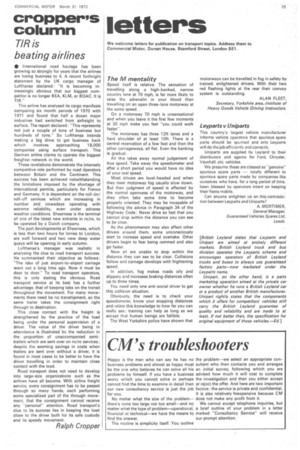cropper's column
Page 27

If you've noticed an error in this article please click here to report it so we can fix it.
TIR is beating airlines
• International road haulage has been growing so strongly for years that the airlines are losing business to it. A recent forthright statement by the UK cargo manager of Lufthansa declared: "It is becoming increasingly obvious that our biggest competitor is no longer BEA, KLM, or BOAC. It is TI R' This airline has analysed its cargo manifests comparing six month periods of 1 970 with 1 971 and found that half a dozen major industries had switched from airfreight to surface. The report declared : This represents not just a couple of tons of business but hundreds of tons." So Lufthansa intends making a big drive to get business back which involves approaching 18,000 companies using surface transport. This German airline claims to operate the biggest freighter network in the world.
These revelations demonstrate the intensely competitive role performed by road Operators between Britain and the Continent. This success has been achieved notwithstanding the limitations imposed by the shortage of international permits, particularly for France and Germany. It is dependent on the roll-On/ roll-off services which are increasing in number and nowadays operating with extreme reliability, even under adverse weather conditions. Sheerness is the terminal of one of the latest new entrants in ro/ro, to be operated by a Dutch company.
The port developments at Sheerness, which is less than two hours for lorries to London, are well forward and two new deep water quays will be opening in early autumn.
Lufthansa's manager was realistic in analysing the clue to road transport success. He summarized their objective as follows: "The idea of just airport-to-airport carriage went out a long time ago. Now it must be door to door," To road transport operators, this is only stating the obvious. Road transport service at its best has a further advantage, that of keeping tabs on the transit throughout the movement. For many movements there need be no transhipment, so the same trailer takes the consignment right through to destination.
This close contact with the freight is strengthened by the practice of the load being under the personal supervision of a driver. The value of the driver being in attendance is illustrated by the reduction in the proportion of unaccompanied semitrailers which are sent over on ro/ro services; despite the seeming savings in costs when trailers are sent over without a driver, it is found in most cases to be better to have the driver travelling in order to maintain close contact with the load.
Road transport does not need to develop into large-size organizations such as the airlines have all become. With airline freight service, every consignment has to be passed through so many hands, each performing some specialized part of the through movement, that the consignment cannot receive any "personal" attention. Road transport's clue to its success lies in keeping the load close to the driver both for its safe custody and its speedy movement.
Ralph Cropper




















































































